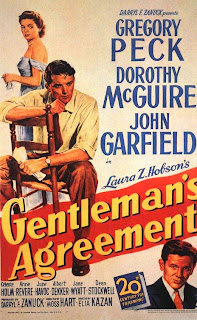by Chris Marshall:
There have been several instances so far where I have been
pleasantly surprised by a movie, where I expected to dislike it going in and
found that it was actually really good. It is with a heavy heart that I say Gentleman’s Agreement was exactly the
opposite.
I guess that on some level I had no expectations at all; it’s
one of those movies that I knew absolutely nothing about before I started this
project. But before I watched it, I learned that it had a very interesting
premise. Gregory Peck goes undercover as a Jew in order to expose the harsh
realities of anti-Semitism in the United States. That sounded way more
progressive than most films made in the late 1940s, and it seemed like an
obvious precursor to Peck’s role as Atticus Finch in To Kill a Mockingbird.
Unfortunately, the concept was much greater than the execution. The
plot just seemed to wander aimlessly, and it never really made a compelling
point. I know there were millions of limitations on what they could show at the
time, but it still felt like they weren’t willing to take any real chances.
Peck’s character, Philip Green, arrives in New York City
with his son, looking for a writing job. He had been a reporter previously, and
he receives an assignment from a magazine to write a story about anti-Semitism.
He struggles for a while before realizing he can never write about this experience
without first living it himself. Thus, Phil Greenberg is born.
The addition of those four letters at the end of his name
makes all the difference in the world. He’s not allowed to book a room in a
hotel. He’s treated differently even by people he knew beforehand (who did not “know”
he was Jewish). He finds it difficult to be seated in a nice restaurant.
These were very real problems and obstacles faced by the
Jewish community, no doubt, but they seem so sanitized. In the movie, they come
across more as minor annoyances than true hardships. This has the unfortunate
side effect of diminishing the film’s main argument. Because they would not (or could not) show the extent of the dark
ramifications of anti-Semitism, it makes many of the complaints seem petty. “Oh,
this is as bad as it gets? Well, could be a lot worse.”
 |
| John Garfield oughta give that anti-Semite a good wallop. |
I honestly believe the filmmakers meant well. I think their
goal was for the movie to be as explosive an indictment of anti-Semitism as
Philip Green’s magazine article was. Sadly, it lacked that impact. It lacked
much of an impact at all.
Just as a brief aside, anti-Semitism is a very strange and
weird hatred. All forms of prejudice and racism are, really, but this one seems
more peculiar to me than most. Most of the time there is at least an obvious,
physical difference, but not here. I don’t understand it at all. The good news,
I suppose, is that today it’s a completely unacceptable attitude to have. It
still exists, of course, but it’s consigned mostly to the darkest, dankest
corners of society.
This isn’t meant as a treatise on prejudice, though. I’m
writing movie reviews, and on that level, Gentleman’s
Agreement is not a success. As a way of bringing people’s attention to this
important issue, perhaps it was. But there is a reason that cinematic history
has mostly forgotten it. I watched it less than a week ago, and I have pretty much forgotten it too.

No comments:
Post a Comment